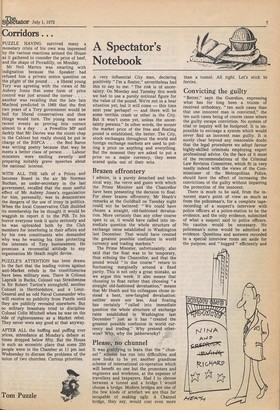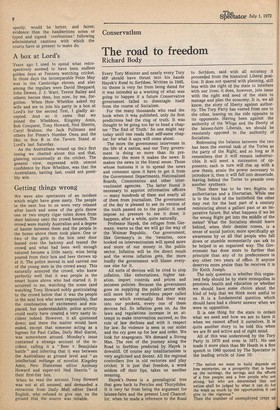A Spectator's Notebook
A very influential City man, declaring positively "I'm a floater," nevertheless had this to say to me: "The risk is of uncertainty. On Monday and Tuesday this week we had to use a purely notional figure for the value of the pound. We're not in a bear situation yet; but it will come — this time next year perhaps? — and there will be some terrible crash or other in the City. But it won't come yet, unless the uncertainty persists." In other words, the sooner the market price of the free and floating pound is established, the better. The City, stock exchanges throughout the world and foreign exchange markets are used to putting a price on anything and everything. But the moment they are asked to put a price on a major currency, they seem scared quite out of their wits.
Brazen effrontery
I admire, in a purely detached and technical way, the verve and gusto with which the Prime Minister and the Chancellor have been presenting the decision to float. For sheer brazen effrontery, Mr Heath's remarks at the Guildhall on Tuesday night could not be bettered: "We could have chosen a straight, old-fashioned devaluation. More certainly than any other course open to us, it would have called into immediate question the whole structure of exchange rates established in Washington last December. That would have created the greatest possible confusion in world currency and trading markets."
The Prime Minister, unfortunately, also said that the float was to be temporary, thus echoing the Chancellor, and that the pound would "in due course" return to fluctuating marginally around a fixed parity. This is not only a great mistake, as we argue this week. It also means that choosing to float rather than choosing "a straight old-fashioned devaluation," means that Mr Heath and his colleagues chose instead a bent, new-fangled devaluation: neither more nor less. And floating has certainly "called into immediate question the whole structure of exchange rates established in Washington last December" just as it has "created the greatest possible confusion in world currency and trading." Why pretend otherwise? Why, why the jabberwocky?
Please, no chunnel
It was gratifying to learn that the " chunnel " schethe has run into difficulties and now looks to be yet another grandiose scheme of international co-operation which will benefit no one but the promoters and engineers and workmen, at the expense of travellers and taxpayers. Had I to choose between a tunnel and a bridge I would choose a bridge. Modern bridges are one of the few kinds of artefact we are thus far incapable of making ugly. A Channel bridge, they say, would cost even more than a tunnel. All right. Let's stick to ferries.
Convicting the guilty
"Better," says the Guardian, expressing what has for long been a truism of received orthodoxy, "ten such cases than that one innocent man is convicted," the ten such cases being of course cases where the guilty escape conviction. No system of trial or inquiry will be foolproof. It is impossible to envisage a system which would never find an innocent man guilty. It is surely clear beyond any reasonable doubt that the legal procedures we adopt favour highly-skilled criminals employing expert professional advice. On the face of it most of the recommendations of the Criminal Law Revision Committee, which fit in very neatly indeed with the views of the Commissioner of the Metropolitan Police, should have the effect of increasing the convictions of the guilty without impairing the protection of the innocent.
There is much to be said, from the innocent man's point of view as much as from the policeman's, for a complete taperecording of a suspect's interview with police officers at a police-station to be the evidence, and the only evidence, submitted of what a suspect said to police officers. No caution would be necessary. No policeman's notes would be admitted as evidence. Questions and answers recorded in a special interview room set aside for the purpose, and " bugged " efficiently and openly, would be better, and fairer, evidence than the handwritten notes or typed and signed ' confessions ' following administered cautions with which the courts have at present to make do.
A box at Lord's
Years ago I used to spend what retrospectively seemed, to have been endless golden days at Fenners watching cricket. In those days the incomparable Peter May was in the Cambridge eleven; and also among the regulars were David Sheppard, John Dewes, J. J. Warr, Trevor Bailey and others; heroes then, but now, by me, forgotten. When Huw Wheldon asked my wife and me to join his party in a box at Lord's for the second Test, I gladly accepted. And so it came that we joined the Wheldons, Kingsley Amis, Bob Conquest, Tony Howard, Ned Sherrin, Caryl Brahms, the Jack Pullmans and others for Pimm's Number Ones and the like, in Box R in the Tavern Stand at Lord's last Saturday.
As the Australians wound up the:r first inning we chatted about this and that, glancing occasionally at the cricket. The general view, expressed with utmost confidence by Huw Wheldon, was that the Australians, batting last, could not possibly win.
Getting things wrong
We were also spectators of an incident which might have gone nasty. The people in the next box to us were very relaxed after lunch and some of the girls threw one or two empty cigar tubes down from their balcony onto the crowd beneath. The crowd were mainly Australian and a degree of banter between them and the people in the boxes above them took place. One or two of the girls in the box next door leaned over the balcony and teased the crowd and what had been well enough natured became a little nasty, wine being poured from their box and beer thrown up at it. The police moved in and carried one of the young men in the crowd away. This naturally annoyed the crowd, who knew perfectly well that it was people in the smart boxes above who had started it. It occurred to me, watching the scene (and watching Tony Howard nobly gesticulating to the crowd below that it was the people in the next box who were responsible), that the combination of excitement and misplaced, but understandable, police activity could easily have created, a very nasty incident indeed. However, it all quietened down; and there the matter would have ended, except that someone acting as a legman for Paul Callan, Daily Mail diarist, was somewhere around. Monday's issue contained a strange account of the incident, calling it a " Beer v. Beaujolais battle" and inferring that it was between the Australians at ground level and "an intellectual mélange of novelist Kingsley Amis, New Statesman editor Anthony Howard and super-wit Ned Sherrin " in their first-tier box.
When he read the account Tony Howard was not at all amused, and demanded a retraction from Daily Mail editor David English, who refused to give one, on the ground that the source was reliable. .























































 Previous page
Previous page